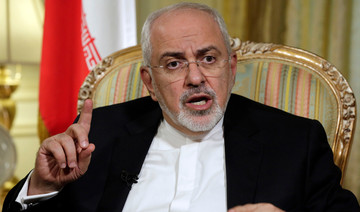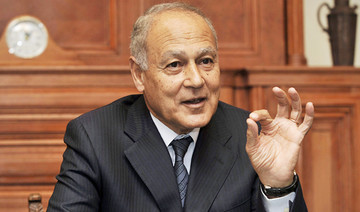TEHRAN/ BEIJING: As Iran’s foreign minister embarked on a diplomatic tour on Sunday to save the nuclear deal, his government faced mounting pressure from hard-liners at home who say the West should never have been trusted.
Ayatollah Ali Jannati, the ultra-conservative head of the Assembly of Experts whose responsibilities include choosing the next supreme leader, said the government had already failed to guarantee the country’s interests.
Iranian President Hassan Rouhani, the key architect of the 2015 agreement, should “present his apologies to the Iranian people for the damage caused in the cadre of the nuclear deal,” Jannati said.
Rouhani reiterated on Sunday that Tehran would remain committed to its 2015 nuclear deal if its interests can be protected and said the US withdrawal from the accord was a “violation of morals.”
“The US withdrawal ... is a violation of morals, the correct way to carry out politics and diplomacy and against international regulations,” Rouhani during a meeting with visiting Sri Lanka President Maithripala Sirisena.
Foreign Minister Mohammad Javad Zarif arrived in Beijing for the first stop of his tour of the remaining members of the nuclear deal.
He is due in Moscow and Brussels in the coming days.
Mirroring the line taken by supreme leader Ayatollah Ali Khamenei, Jannati said there was little chance the Europeans would provide the assurances needed for Iran to stay in the deal.
The Europeans “have never stopped taking actions against Iran,” he wrote.
The head of the Revolutionary Guards, Mohammad Ali Jafari, also criticized “certain officials” who “look to outsiders.”
“I hope recent events will lead us ending our trust in the West and the Europeans. The Europeans have repeated on several occasions that they will not be able to resist US sanctions,” said Jafari, according to the conservative Fars news agency.
Around 100 Iranian lawmakers have also signed on to a Parliament bill that would set a clear deadline for the government to “obtain necessary guarantees from the Europeans” without which Iran would resume high-level uranium enrichment, according to Parliament’s official website.
Although conservatives have tried to score political points against Rouhani in the wake of the US withdrawal, the president has essentially taken the same line.
Immediately after US President Donald Trump’s withdrawal from the deal last Tuesday, Rouhani said he had instructed Iran’s Atomic Energy Organization to prepare for “industrial enrichment without limit” unless Iran’s interests were guaranteed by the remaining parties.
‘Clear future design’
Zarif said he was hopeful of forging a “clear future design” for the nuclear deal facing collapse after Washington’s withdrawal, at the start of a diplomatic tour aimed at rescuing the agreement.
“We hope that with this visit to China and other countries we will be able to construct a clear future design for the comprehensive agreement,” Zarif told reporters on Sunday after talks in Beijing with his Chinese counterpart Wang Yi.
In what is seen as a last-ditch effort to save the accord, Zarif has embarked on a tour of world powers.
Zarif will later fly to Moscow and Brussels to consult the remaining signatories to the 2015 agreement denounced by Trump. His withdrawal from the deal last week has infuriated Washington’s allies in Europe as well as China and Russia.
US President Donald Trump’s decision on Tuesday to pull out of the nuclear deal has upset European allies in Europe as well as China and Russia, cast uncertainty over global oil supplies and raised the risk of conflict in the Middle East.
China was one of the six powers — with the US, Russia, France, the UK and Germany — that signed the historic pact which saw sanctions lifted in return for the commitment by Tehran not to acquire nuclear weapons.
Iran has said it will stay committed to the deal if powers still backing the agreement can ensure it is protected from sanctions against key sectors of its economy such as oil.
As he arrived in Beijing, Zarif said, “we will discuss the decision that Iran should take,” according to the semi-official ISNA news agency.
He added: “As the president of the republic has said, we are ready for all option(s). If the nuclear deal is to continue, the interests of the people of Iran must be assured.”
Earlier, Zarif hailed Tehran’s relations with Beijing, ISNA reported.
“We have had good relations with China before and since the deal,” he said.
“China is by far the first economic partner of Iran. We are certain that today China is by our side.”
Tehran’s chief diplomat embarked on the tour as regional tensions spiked just days after unprecedented Israeli strikes in Syria which a monitor said killed at least 11 Iranian fighters, triggering fears of a broader conflict between the two arch-enemies.
Before leaving, Zarif published a government statement on his Twitter page, slamming Trump’s “extremist administration” for abandoning “an accord recognized as a victory of diplomacy by the international community.”
It reiterated that Iran was preparing to resume “industrial scale” uranium enrichment “without any restrictions” unless Europe provided solid guarantees it could maintain trade ties despite renewed US sanctions.
Trump hit back Saturday evening, tweeting that the accord had failed to contain Iran’s militarism.
“Iran’s Military Budget is up more than 40 percent since the Obama negotiated Nuclear Deal was reached... just another indicator that it was all a big lie,” he wrote.
Zarif’s delicate diplomatic mission was complicated by reports of clashes between Iranian and Israeli forces in Syria on Thursday.
The Syrian Observatory of Human Rights said Saturday that 11 Iranians were among the pro-regime fighters killed in strikes by Israel, which has vowed to prevent Iran gaining a military foothold in neighboring Syria.
Tehran, which has sought to avoid an escalation in a regional conflict that could alienate its European partners, has not commented on whether its forces were hit.
Israel and its allies have blamed Iran’s Revolutionary Guards for initiating Thursday’s exchange by launching missiles into the occupied Golan Heights.
Iran denies the claims, saying the Israeli strikes were launched on “invented pretexts.”
Meanwhile, European diplomats in Tehran fumed that Trump’s decision to withdraw from the nuclear deal could undermine years of patient work to restore commercial and diplomatic ties with the Islamic Republic.
“Since the signing of the JCPOA (nuclear deal), we have gone from an atmosphere like a gold rush, to one of utter depression,” said a Western trade diplomat on condition of anonymity.
“We are waiting now for how the decision makers in the European Union will react. If the EU leans toward accommodating the US, all the progress we have made since 2015 will be lost.”
Iranian hard-liners — who have long opposed Rouhani’s moves to improve ties with the West — are already mobilizing against the efforts to save the nuclear deal.
Mohammad Ali Jafari, head of the Revolutionary Guards, said the country could not rely on the West.
























